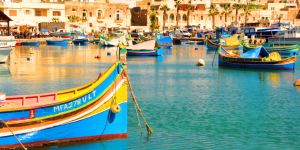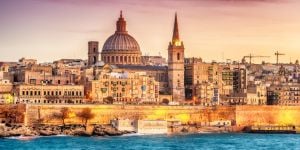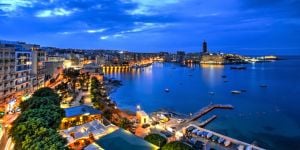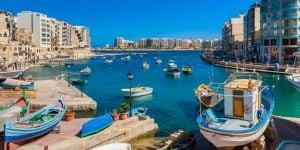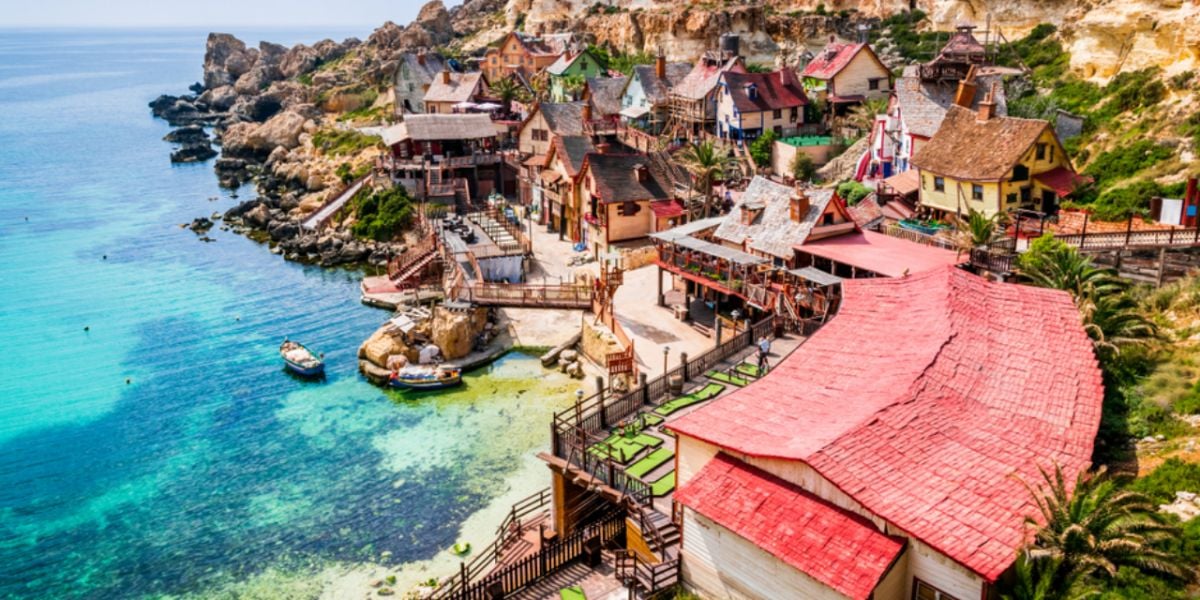
Before traveling to Malta, it is highly recommended to research the formalities, especially the visa requirements and the duration of stay. Nationals of certain countries must apply for a visa, while others are exempt.

EU nationals, for example, can simply present their passport or identity card to stay in Malta for up to 90 days. Nationals from some other countries only need a visa to transit through Malta.
Entry and stay formalities in Malta
Malta consists of an archipelago made up of eight islands in total, including three main islands (Malta, Comino, and Gozo). This small paradise is increasingly sought after by expatriates and is renowned for its fantastic landscapes. Merħba!
However, it is essential to know the requirements and formalities to which you are subject before traveling to Malta.
Nationals from certain countries must provide their return ticket or show proof of sufficient funds to be allowed to stay in Malta.
To enter Malta, EU nationals only need a valid identity card or passport, and a return ticket is not necessary.
They can stay indefinitely, provided they register with local authorities after three months to obtain the eResidence card.
Cyprus, Ireland, the United Kingdom, and Ukraine are not part of the Schengen area. Therefore, nationals of these countries may be required to present their identity card or passport both upon entering and leaving Malta.
In general, nationals from non-EU countries must apply for a visa to travel to Malta, regardless of the length of their stay. However, there are exceptions.
Indeed, nationals of non-EU countries but members of the Schengen area (Iceland, Liechtenstein, Norway, and Switzerland) are exempt from a visa to come to Malta.
Additionally, holders of British, Canadian, American, Australian, and Japanese passports do not need a visa for any stay of up to 90 days within a 180-day period in the entire Schengen area. However, their passport must be valid for at least three months after the date of exit from the territory and must have been issued within the last 10 years.
Good to know:
The visa exemption only applies to stays for tourism or family purposes, attending business meetings, cultural or sporting events, or short-term training. A visa becomes necessary for working or studying in Malta and for stays longer than 90 days.
Nationals from certain other countries are exempt from the visa requirement if their stay does not exceed three months and is for tourism purposes.
The Schengen visa to travel to Malta
Malta is a member of the Schengen area, comprising 29 European countries and allowing free movement without control at internal borders.
Common to all Schengen area member countries, the Schengen visa allows a maximum stay of 90 days (3 months) for a continuous stay or for several stays in the Schengen area countries over a 180-day (6 months) period. This is known as the 90/180 rule.
Two scenarios are possible:
- You have a single-entry Schengen visa - In this case, you can stay in Malta for 90 days;
- You have a multiple-entry Schengen visa - This type of visa allows you to enter and exit Malta multiple times, provided that the total duration of your stay does not exceed three months over a six-month period. Therefore, keep in mind the duration of each stay in the Schengen area, as they accumulate.
To prove that you comply with the 90-day limit, have your passport stamped by border police at each entry and exit from the Schengen area.
Good to know: Nationals of third countries can travel to non-Schengen European countries before or after a trip to Malta. The duration of stay in these countries will not be counted in the maximum stay duration in the Schengen area.
The fees for obtaining a Schengen visa amount to 90 euros. For children aged 6 to 12 years, you will need to pay 45 euros. The visa is free for children under 6 years.
Note that for nationals of Armenia, Azerbaijan, and Belarus, the fees amount to 35 euros, while they are 67.50 euros for nationals of Cape Verde. The application must be made at least one month before the planned departure date.
Schengen visa applicants must prove that they have sufficient funds to support themselves during their stay.
Extending your stay in Malta
Holders of a Schengen visa are only allowed to extend their stay in Malta under exceptional circumstances (i.e., in cases of force majeure or for humanitarian reasons).
Outside of these circumstances, all foreign nationals intending to stay in Malta for more than 90 days must apply for a residence permit.
In general, the conditions and requirements for extension vary from country to country. It is therefore advisable to check your specific situation with Identity Malta (the government agency that issues identity cards, passports, visas, residence documents, civil status documents, and public acts in Malta).
The laws related to residence permits vary depending on the applicant's country of origin. Detailed information is available on the website of the Ministry for Home Affairs, Security, and Employment (the link is in the "Useful links" section at the bottom of this article).
Traveling to Malta with your pet
If you plan to travel to Malta with your pet, you must meet specific requirements.
If your pet comes from another EU country, it must have a microchip, a pet passport, and an up-to-date rabies vaccination certificate and an official health certificate issued by a veterinarian.
Finally, if you are importing a dog, it must be treated against tapeworm, regardless of its origin.
For humans, no vaccination is required.
Getting to Malta
You can reach the archipelago by plane or by boat. Most travelers come to Malta by plane.
The ticket prices to Malta from major European cities are generally attractive, but vary depending on the season and the airline. The lowest fares start around 50 euros from Paris for a one-way ticket.
Expect to pay between 90 and 180 euros from Paris or Brussels, at least 50 Swiss francs from Geneva or Zurich, and at least 500 Canadian dollars from Montreal, Toronto, or Ottawa.
Several airlines serve Malta, with the main ones being KM Malta Airlines (the national airline), Ryanair, EasyJet, Air France, Alitalia, British Airways, Emirates, Qatar Airways, Lufthansa, Swiss, Transavia, Turkish Airlines, ITA Airways, Volotea, and Wizz Air.
To travel to Malta by boat
You must first travel to Italy, then purchase a ticket from one of the ferry companies that offer regular crossings. This option is more expensive than flying, but much more romantic, and allows you to easily transport your car. The departure is from Pozzallo in Sicily.
Virtu Ferries, for example, offers a one-way ticket with a Peugeot 208 car for 176 euros from Pozzallo to Valletta.
If you are a yachtsman, there are over 900 berths (for boats up to 22 m) in the marinas of Ta' Xbiex, Msida (Valletta), and Mġarr (Gozo). You will easily find young volunteers willing to travel who will work for you voluntarily to enjoy the crossing.
Languages spoken in Malta
Malta has two official languages: English and Maltese, so if you speak English, you will be able to communicate easily on a daily basis.
However, you will notice that Maltese is omnipresent, as it is both an official language and the national language of Malta. Maltese people often use Maltese to communicate with each other.
Maltese is a Semitic language
Unique in the European Union, and is written using the Latin alphabet. It is largely derived from Arabic but also includes Italian, English, and even French words.
Currency in Malta
In Malta, the euro has been used since 2008, which makes it easier for people coming from European countries using the same currency.
The main credit cards are accepted almost everywhere, and ATMs are common, even in small towns. Bank opening hours are generally from 8:30 a.m. to 1:30 p.m. Monday to Thursday, from 8:30 a.m. to 3:30 p.m. on Friday, and from 8:30 a.m. to 12:30 p.m. on Saturday.
Electrical outlets in Malta
Malta, being a former British colony, uses type G outlets with three rectangular prongs. There is no need to buy an adapter if you are coming from the UK or another country that uses this type of outlet. Otherwise, you should bring your own. The voltage used is 230 volts.
Mobile phone and internet in Malta
Malta is part of the European Union. Therefore, if you have a mobile phone plan from a member country, it will be valid in Malta. You can use your phone and mobile data as you would in your own country, without additional charges. Otherwise, you will need to buy a SIM card locally.
Wi-Fi is widely available in Malta, making it easy to stay in touch with loved ones. The main cities have designated kiosks where you can connect to the Internet for free. Restaurants and bars generally have secure access.
Driving in Malta
Driving in Malta is on the left. Keep this in mind if you plan to rent a car.
Be careful when crossing the road: look right first, then left.
Time in Malta
Malta is in the UTC/GMT 1 time zone in winter and UTC/GMT 2 in summer. This means that the time is the same as in France, Belgium, Switzerland, Italy, Spain, and Germany. If you come from one of these countries, you will have no problem contacting your family or friends.
Living in Malta
Malta is probably the safest place in the Mediterranean, where you can walk around without fear at any time of day or night. As a precaution, security cameras are placed in the streets.
Religion plays an important role in Malta where 98% of the population is Catholic and 85% of the inhabitants are practicing.
There are 14 public holidays in Malta. Some local shops are open, but with special hours, most of them being closed. The public holidays in Malta are:
- January 1 (New Year);
- February 10 (Feast of St. Paul's Shipwreck);
- March 19 (Feast of St. Joseph);
- March 31 (Freedom Day);
- April 18 (Good Friday);
- May 1 (Labor Day);
- June 7 (Sette Giugno);
- June 29 (Feast of Saints Peter and Paul);
- August 15 (Assumption);
- September 8 (Feast of Our Lady of Victories);
- September 21 (Independence Day);
- December 8 (Feast of the Immaculate Conception);
- December 13 (Republic Day);
- December 25 (Christmas).
Trivia: What do Popeye, The Count of Monte Cristo (2002), U-571, Midnight Express, Asterix and Obelix: Mission Cleopatra, Troy, The Spy Who Loved Me, World War Z, Largo Winch, Gladiator, Munich, By the Sea, and Game of Thrones have in common? They were partially or entirely filmed in Malta!
Useful links:
We do our best to provide accurate and up to date information. However, if you have noticed any inaccuracies in this article, please let us know in the comments section below.
